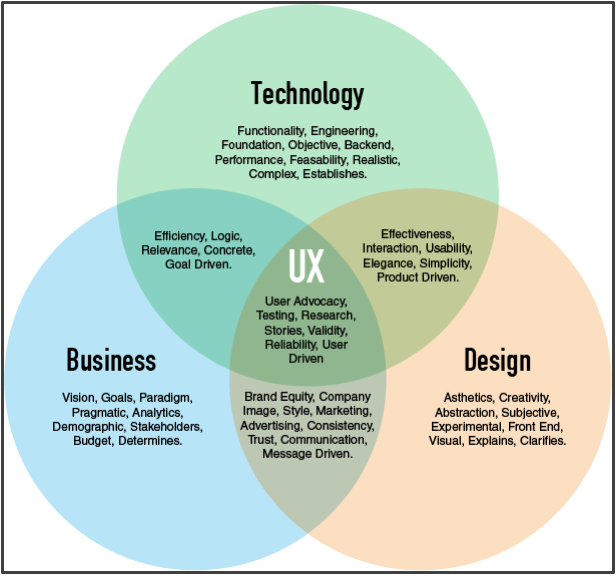Communication Skills
Let’s kick it off with a Venn diagram. It explains the role of UX and how it’s not a field in itself. Not only does it highlight the multidisciplinary nature of UX, but it also shows that most of the time the UXer forms the medium between other fields, often with conflicting purposes. Handling this tension requires very strong communication skills. Other communication-heavy tasks like presenting results, workshops, conducting interviews, or even selling yourself (for all you freelancers and “between jobs” people out there) benefit from improved communication skills.

Analytical Skills
This is an essential one when dealing with data. Empathy and intuition help little when facing the raw numbers of Google Analytics. Data has an increasing say when it comes to product development and marketing, making the ability to set up proper KPIs and to extract information from data invaluable.
Visual Design Skills
Working in the UX field doesn’t necessarily require excellent visual design skills; however, it certainly does give an advantage, especially if you have experience in designing user interfaces. You need to understand typographical rules, color theory, visual hierarchy, as well as being on top of the latest design trends and best practices.
Empathy
This is arguably one of the most important ones. UX focuses on people. This profession ultimately aims to help them improve their lives, work, or whatever else your product is doing. Thus empathy is a core “skill” in user experience design. Developing the skill to think about problems from other people’s point of view is paramount. For some people this comes instinctively; others need to work more on this. One thing is for sure: You can’t do this job very well with an egoist mindset.
Understanding of Coding
For most UX designers, their job deals with technology, so understanding what makes up a digital product as well as the technological constraints and possibilities provides an unbeatable advantage. However not only coding pros can use this knowledge. Even a basic knowledge of HTML, CSS and Javascript can prove useful in prototyping or interaction design. In dealing with interfaces, coding skills can help design modularly.
It also helps you design a product within the limitations of a development budget, which is especially important if you are working at a startup, have a short development deadline, or are heavily confined by a budget.
Project Management Skills
This skill can come in handy in almost every job, but in UX it plays a special role. The ability to precisely plan and execute a project is just the tip of the iceberg. Incorporating the UX workflow with the development process can pose a difficult task. Most teams work with an “agile” methodology, so learning how that works will make you more valuable to employers.
Business Understanding and Strategic Mindset
UX has gained a lot of influence in business and strategy lately. More companies have started to recognize the relationship between user experience design and business growth, which of course is shaping the role of UX designer requirements as well. Every successful company out there should value a designer who can think holistically and also understand business needs.
Designing the worlds best login screen might be really interesting from a design perspective, but if it doesn’t add a corresponding value to the business then you aren’t adding as much value as you could be.
Writing Skills
Copy almost always forms part of the UI. Badly written copy on a button, error message or security note can destroy the entire experience. Writing is playing an ever growing role in UX, and many companies are hiring people purely for UX writing, which shows its importance.
To improve my own writing I recently started writing articles right here on Medium. If you haven’t seen my piece about why Chrome is now the best browser for iOS, check it out here:
Critical Thinking
This might seem like an odd one, but being able to differentiate between what looks good at face-value and what is actually good can be the difference between a decent product and an amazing product.
This will also help you better identify what type of place you will be working for and generally help when doing research for various UX projects throughout your career.
A Healthy Curiosity
Yet another soft-skill … seems to be a pattern here. UX is an ever developing field, and what “worked” yesterday might not work tomorrow. What works in the US might not work in Asia, and probably won’t work in a region like Southern-Africa. So having a deep sense of curiosity is crucial to staying on top of your game and exploring new ways to solve problems.
A lot of people think curiosity is something you either have, or don’t have. Like most skills it is definitely something some people are naturally better at, but curiosity can be trained & maintained. I’d recommend downloading new apps and trying them out every week, and keep an eye out for award winning websites and products.



